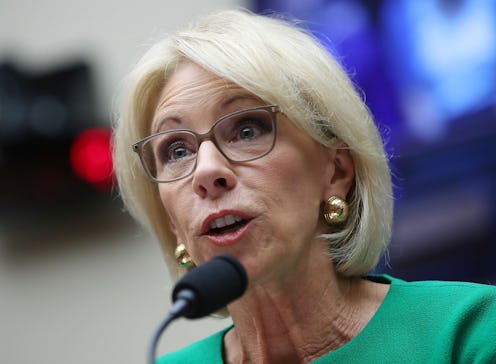News
Betsy DeVos Said Schools Can Report Undocumented Students To ICE, Which Is Illegal

It's illegal for school officials to take action against undocumented students, but Education Secretary Betsy DeVos seems to have missed the memo. While testifying in front of Congress Tuesday, DeVos said that schools can report undocumented students to Immigrations and Customs Enforcement (ICE) if they so desire. But as several civil rights groups immediately pointed out, DeVos has her facts wrong: The Supreme Court and multiple lower courts have repeatedly ruled that it's unconstitutional for schools to try and get undocumented students deported.
"If a principal or a teacher finds out that a certain child is undocumented, or his or her family members are undocumented, do you feel that the principal or teacher is responsible to call [Immigration and Customs Enforcement] and to have that family reported?," Rep. Adriano Espaillat asked DeVos at a testimony before the House Committee on Education and the Workforce.
“Sir, I think that’s a school decision,” DeVos replied. “That’s a local community decision. And again, I refer to the fact that we have laws and we also are compassionate, and I urge this body to do its job and address or clarify where there is confusion around this.”
But as the ACLU and other organizations quickly noted, the question of whether to report undocumented students to ICE is not a "school decision" — because it's not a decision that schools legally have the right to make.
In the 1982 case Plyler v. Doe, the Supreme Court looked at a Texas law that sought to withheld state money from school districts that educated children of undocumented immigrants. The court ruled that undocumented immigrants and their children are protected from discrimination under the 14th Amendment, and that because the Texas law gave undocumented children a "permanent and insurmountable competitive disadvantage," it was unconstitutional.
This ruling set a precedent that schools can't implement measures that make it harder for undocumented students to receive education, and although several states have attempted to violate this precedent, none have succeeded. In 1994, for instance, California voters passed Proposition 187, which required schools to expel undocumented immigrants and report them to authorities. The law was struck down by the courts before it took effect. In 2011, Alabama passed a law that required schools to ask students about their immigration status; that provision, along with most of the law, was permanently blocked after a successful challenge by the Department of Justice.
DeVos said that the question of whether to report undocumented students to ICE is a "school decision," and a "local community decision." But it's not. The decision has already been made by the courts: Schools may not report undocumented students to immigration authorities.
Teachers and civil rights groups promptly condemned DeVos for her remarks on Tuesday. Thomas A. Saenz, president of the Mexican American Legal Defense and Educational Fund, said in a a statement that that her testimony "stems either from an astounding ignorance of the law or from an insupportable unwillingness to accurately advise local school districts." National Education Association President Lily Eskelsen García told the Washington Post that DeVos "should know better," and that suggesting that school authorities have the right to report undocumented students "only serves to frighten children."
“Let’s be clear: Any school that reports a child to ICE would violate the Constitution," Lorella Praeli, the ACLU’s director of immigration policy and campaigns, wrote on Twitter. "The Supreme Court has made clear that every child in America has a right to a basic education, regardless of immigration status. As usual, Secretary DeVos has no idea what she’s talking about."
In a statement to the Post, an Education Department spokesperson said that DeVos "has repeatedly said that DACA students have the right to a K-12 education." This doesn't address DeVos' claim, however, as she referred not only to DACA students — a subcategory of undocumented immigrants who've temporarily been shielded from deportation — but rather, all immigrants.